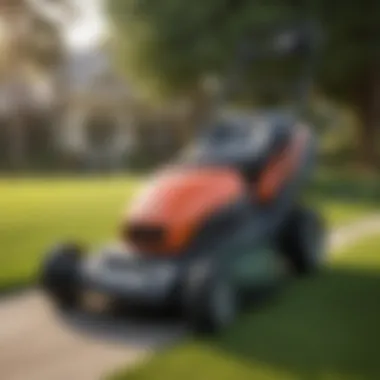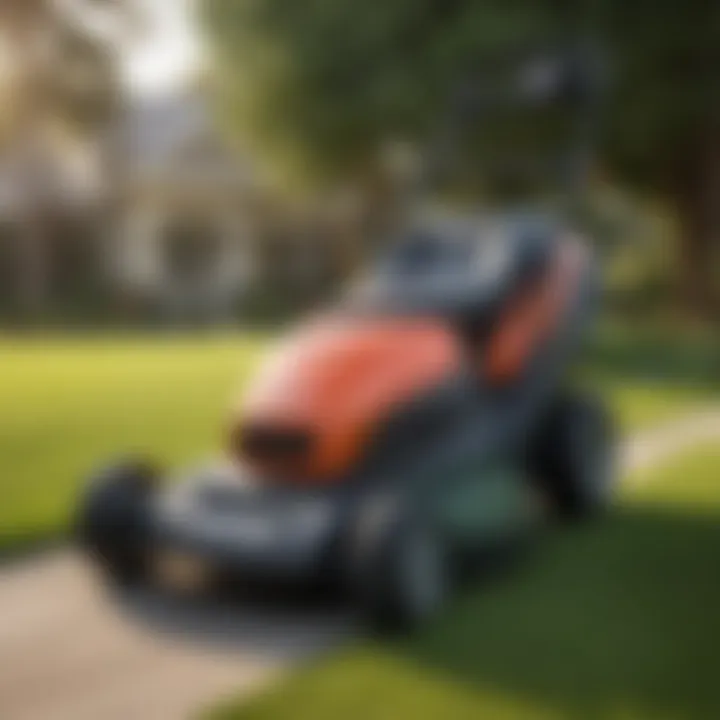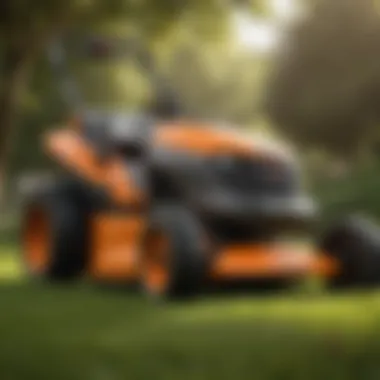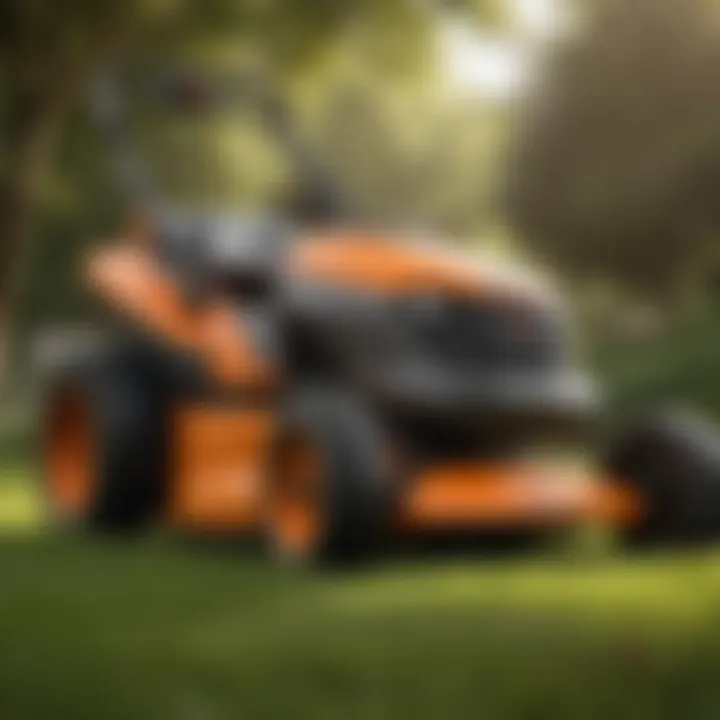Exploring American Made Electric Lawn Mowers


Intro
The shift towards sustainable practices in lawn care has brought American made electric lawn mowers to the forefront. This article delves into the essentials of these machines, exploring their superiority over traditional gas-powered models. It focuses on multiple facets, including environmental impact, performance metrics, cost efficiency, and technological advancements, all while underscoring the importance of local manufacturing. By supporting American-made products, consumers not only contribute to local economies but also embrace a more sustainable future in lawn care.
Understanding the relevance of electric lawn mowers involves recognizing changing consumer preferences toward greener alternatives. The integration of advanced technologies in manufacturing these mowers has made them increasingly viable for both residential and commercial applications. The journey to understanding their significance encompasses examining statistical data and market trends that highlight their growing adoption.
Research and Data Analysis
Electric lawn mowers have witnessed a surge in popularity, coinciding with broader trends in sustainable agriculture and horticulture. The environmental benefits they present are compelling, reducing not only carbon emissions but also noise and air pollution associated with gas-powered variants. Research indicates that consumers are increasingly prioritizing products that align with eco-friendly values. In the United States, a significant number of homeowners engage in practices aimed at reducing their carbon footprint.
Latest Trends in Agriculture and Horticulture
The demand for electric solutions in lawns parallels trends seen in agriculture. For farmers and enthusiasts, this includes a shift towards precision agriculture, which emphasizes efficiency in management practices. Electric lawn mowers serve as a microcosm of this shift, embodying the same principles of efficiency and sustainability:
- Easier to Maintain: Lower maintenance compared to gas mowers.
- Less Energy Consumption: Operate on electricity rather than fossil fuels.
- Technological Integration: Features such as smart technology for improved efficiency.
Statistical Insights into Market Growth
Statistical evidence is vital in understanding the preference shift. Recent surveys reveal that consumers in the United States are increasingly leaning toward electric machines due to concerns about pollution and long-term costs. Such insights underscore a promising trajectory for manufacturers who emphasize sustainability in their products.
"The adoption of environmentally conscious tools in lawn care correlates strongly with the agricultural trend of advocating for sustainability in all operations."
Best Practices and Techniques
Selecting the right electric lawn mower also involves understanding best practices in its usage and maintenance. By utilizing these machines correctly, users can maximize their efficiency and lifespan.
Efficient Lawn Care Strategies
- Regular Cleaning: Keep blades clear of debris for optimal performance.
- Scheduled Charging: Implement charging schedules to maximize battery lifespan.
- Height Adjustment: Adjust cutting height seasonally for better grass health.
Sustainable Lawn Care Techniques
- Mulching: Using a mulching blade returns nutrients to the soil.
- Composting: Encourage natural processes in waste management.
- Diversity in Planting: Promotes resilience against pests and diseases.
Pest and Disease Management
Even in sustainable lawn care practices, maintaining the health of the grass involves addressing pest and disease concerns. Electric mowers, while part of a greener solution, should be complemented with integrated pest management strategies.
Common Pests and Diseases in Lawns
- Grubs: These larvae feed on grassroots and weaken the turf.
- Brown Patch: Fungal disease resulting in unsightly patches.
Integrated Pest Management Strategies
- Regular Monitoring: Observe lawns regularly for signs of insects or disease.
- Biological Controls: Use beneficial insects to manage pest populations.
- Cultural Practices: Maintain proper watering and fertilization schedules.
Understanding these aspects helps refine choices in equipment, which also leads to better decision-making in terms of lawn health and sustainability.
Preface to Electric Lawn Mowers
Electric lawn mowers are becoming significant in lawn care. They are more than just tools; they represent a shift in how we maintain our green spaces. In this section, we will discuss the relevance of electric lawn mowers in today's world, especially focusing on American-made options.
Overview of Lawn Care Technology
The advancement in lawn care technology has led to the development of electric mowers that cater to the needs of modern gardeners. These machines use electric power to operate, which provides a cleaner and more efficient way to manage lawns. Unlike traditional gas mowers, electric models reduce emissions and noise pollution, making them favorable for residential zones.
Benefits of Electric Lawn Mowers
- Environmentally Friendly: They do not emit carbon gases like gasoline mowers.
- Less Noise: Electric mowers operate quietly, reducing noise disturbance in neighborhoods.
- Low Maintenance: They require less maintenance compared to their gas counterparts.
In sum, the rise of electric lawn mowers shows a commitment to sustainability and efficiency in lawn care. With innovations continuing to emerge, the electric mower is gaining acceptance among homeowners and professional landscapers alike.
Electric vs. Gasoline Lawn Mowers
Choosing between electric and gasoline lawn mowers is a common concern for many consumers, especially gardeners interested in performance and environmental impact. There are distinct differences between them.
Electric Mowers:
- They are powered by batteries or electricity, offering quiet operation and minimal emission.
- Typically lighter and easier to maneuver.
- Ideal for small to medium lawns with easy access to power.
Gasoline Mowers:
- Powered by internal combustion engines, offering more power for larger areas.
- Tend to be heavier and can be more challenging to operate.
- Require regular maintenance and fuel management, which can add to the overall cost of ownership.
"The choice between electric and gasoline mowers often comes down to personal preferences and specific gardening needs."


Ultimately, the decision will hinge on factors like lawn size, environmental considerations, and long-term costs. As consumers become more aware of the benefits of electric solutions, it is reasonable to expect that electric lawn mowers will only continue to gain popularity in the market.
History of American Made Electric Lawn Mowers
Understanding the history of American-made electric lawn mowers is quite significant. It offers insight into the development and innovation within lawn care technology and captures the evolution of consumer preferences towards more sustainable and efficient gardening solutions. Electric mowers reflect broader societal trends such as the shift towards environmentally friendly practices and advancements in battery technology. Recognizing this history also aids manufacturers and consumers in grasping the landscape of today's market, thus allowing for more informed decisions.
Evolution of Electric Lawn Mowers
The journey of electric lawn mowers began in the late 20th century when the demand for cleaner alternatives to gasoline-powered devices increased. Early models were cumbersome, often limited by their battery life and cutting capabilities. However, over the decades, various improvements were made in electric mower technology. These included enhancements in battery efficiency, making them more viable for extended use. The introduction of lithium-ion batteries has been particularly transformative, providing consumers with greater power, lighter weight, and extended runtimes.
Furthermore, the design aspect was also refined. Many current models are ergonomically designed for ease of use, while others incorporate features like adjustable cutting heights and mulching capabilities. This evolution in design and function reflects consumer demands for better performance and eco-friendliness.
Key Manufacturers in the U.S.
Several manufacturers are pivotal in the American electric lawn mower market. Companies like Ego Power+, Greenworks, and Toro have solidified their presence with products that showcase the progression in technology and design.
- Ego Power+ has earned recognition for its powerful electric mowers. They emphasize battery life and compatibility with various outdoor tools, which is attractive for many homeowners.
- Greenworks focuses on sustainability, producing mowers that cater to environmentally conscious consumers while maintaining high performance.
- Toro, a long-established name in outdoor power equipment, has also adapted to these trends by offering electric models alongside their traditional gasoline options.
These manufacturers not only lead in innovation but also contribute to a more sustainable lawn care industry by promoting American-made products, which reduces transportation carbon footprints while supporting local economies.
The shift towards electric mowers signifies a broader commitment to sustainability in lawn care practices. This evolution aligns with changing consumer awareness and preferences, making electric mowers a compelling choice in modern garden maintenance.
Benefits of Electric Lawn Mowers
The benefits of electric lawn mowers are multifaceted. They extend beyond mere convenience, reaching into important areas like environmental sustainability, cost efficiency, and user convenience. By examining these benefits closely, it becomes apparent why electric lawn mowers are appealing options for consumers. Their growing popularity is not just a trend but a reflection of conscious choices towards a more sustainable future and efficient lawn care practices.
Environmental Impact
Electric lawn mowers present notable advantages when it comes to environmental impact. Unlike gasoline mowers, which emit harmful exhaust gases, electric mowers produce minimal to zero emissions during their operation. This reduction in air pollution plays a significant role in combating climate change and preserving air quality. Additionally, many electric mowers run on rechargeable batteries, which can be powered by renewable energy sources. This aspect enhances energy sustainability, aligning well with the global efforts towards cleaner energy consumption.
Moreover, electric mowers operate at lower noise levels, reducing noise pollution. Lawns in residential areas can be maintained without disturbing neighbors or local wildlife. Furthermore, electric mowers do not require oil changes, reducing the environmental hazard of oil spills and waste. Overall, the environmental benefits align with a broader commitment to stewardship and responsible lawn care.
Cost Efficiency
Cost efficiency is another important consideration. Although the initial investment for electric lawn mowers can be higher compared to traditional gas mowers, the long-term savings often outweigh the initial costs. Electric mowers typically have lower operational costs since electricity is generally cheaper than gasoline. Additionally, the maintenance costs are significantly lower. Electric lawn mowers have fewer moving parts than gasoline mowers, which translates to less frequent repairs and longer lifespans.
Moreover, some consumers can take advantage of government incentives for purchasing electric lawn equipment. These programs are designed to encourage the adoption of environmentally friendly technologies, making electric mowers an even more economically attractive option. The cumulative savings from reduced fuel and maintenance expenses can make electric lawn mowers a wise financial choice in the long run.
User Convenience
User convenience is a considerable factor for many consumers choosing electric lawn mowers. The straightforward operation of electric mowers makes them appealing. Many models feature push-button starts, eliminating the hassle of pull cords seen in gasoline models. This feature makes it easier for users of all ages and abilities to operate the mower with minimal effort.
Electric mowers are lighter and easier to handle, which can be a significant advantage for those with limited strength or mobility. They can also be more compact, facilitating easier storage in sheds or garages. Additionally, the quiet operation enhances the mowing experience, allowing users to focus on their work without distraction.
Lastly, modern electric mowers often come equipped with smart features, allowing connectivity with smartphones or smart home systems. This capability can be seen in some models that provide real-time monitoring and alerts, helping users manage their mowing schedule effectively.
A comprehensive understanding of the various benefits of electric lawn mowers can guide consumers toward informed decisions that suit their lawn care needs while promoting sustainable practices.
In summary, the benefits of electric lawn mowers include their positive environmental impact, long-term cost efficiency, and user-friendly operation. These aspects make electric mowers an attractive option for individuals who value sustainability and practicality in lawn care.
Technological Advancements in Electric Lawn Mowers
Technological advancements in electric lawn mowers have transformed the landscape of residential and commercial lawn care. These updates not only enhance performance but also improve the overall user experience. Understanding the specifics of these advancements is essential for consumers who wish to make informed choices.
Battery Technology Improvements
Battery technology stands as a pivotal element in the evolution of electric lawn mowers. Over the years, substantial developments have occurred in this sector, with lithium-ion batteries leading the charge. These batteries are lighter, more efficient, and have a longer lifespan compared to their lead-acid counterparts. The capacity of modern batteries allows users to mow larger areas on a single charge, making electric mowers viable for more extensive lawns.
Moreover, fast-charging capabilities have emerged, enabling users to recharge batteries in just a couple of hours. This feature is particularly beneficial for those who require swift turnaround in their lawn care routine.
"The advancements in battery technology not only reduce downtime but also lead to less environmental impact due to the efficient use of resources."
Smart Features and Connectivity
Smart technology is now a common feature in electric lawn mowers. Many units come equipped with connectivity options that allow for enhanced control and convenience. For example, users can link their mowers to mobile apps for monitoring battery levels, scheduling mowing times, or even controlling the mower remotely.
These smart features incorporate real-time feedback on the mower's performance and can suggest optimal mowing patterns based on the specific lawn conditions. Some advanced models even come with GPS tracking and geofencing capabilities, ensuring safe and efficient navigation within defined boundaries.
As the trend towards automation and digital integration continues, these innovations offer considerable benefits to consumers, making lawn care more manageable and time-efficient.
In summary, continuing advancements in battery technology and smart features significantly enhance the utility of electric lawn mowers, paving the way for increased adoption among consumers.
Performance Analysis
Performance analysis is crucial in evaluating the effectiveness of American made electric lawn mowers. This aspect speaks directly to their operational capabilities, which in turn affects user satisfaction and overall lawn care results. Analyzing performance involves understanding critical metrics such as cutting power, efficiency, and how these machines measure up against their gasoline counterparts. By dissecting these elements, consumers can make informed choices that align with their gardening needs and environmental values.


Cutting Power and Efficiency
Electric lawn mowers are designed with specific features that influence their cutting power and efficiency. The cutting power of an electric lawn mower refers to its ability to trim grass uniformly and handle varying lawn conditions. Intact blades and the mower's motor strength significantly determine this capability.
Efficiency in this context means the mower's ability to manage energy consumption relative to its output. Modern electric mowers often incorporate brushless motors that provide better torque and additional power without unnecessary energy waste. Consequently, these machines can efficiently tackle tougher tasks without a substantial drop in performance.
- Electric mowers typically operate at low noise levels.
- They require less upkeep than gas-powered options, as they have fewer moving parts.
- Many models allow for adjustable cutting heights, giving users flexibility to meet different lawn conditions.
Comparative Performance with Gasoline Mowers
When juxtaposing electric mowers to gasoline models, several significant differences emerge. Gasoline mowers have historically been favored for their robust power and longer running times. However, advancements in electric mower technology are closing this gap. Some electric models now match or exceed gasoline mowers in terms of cutting performance and efficiency.
- The propulsion method affects the responsiveness of the mower. Electric mowers can deliver power instantly, allowing for quicker maneuvering.
- Battery technology continues to improve, leading to longer run times and reduced charging intervals.
- Reliability is often cited in favor of electric models due to their simplicity in construction, as they require less maintenance than gas mowers.
"The progression in technology is redefining industry standards, making electric mowers a viable option for a wider range of consumers."
Consumer Preferences and Trends
Consumer preferences and trends play a significant role in shaping the demand for products, including electric lawn mowers. As environmental concerns rise and consumers seek more sustainable options, the electric lawn mower market has gained traction in recent years. This section explores the current market dynamics and the characteristics that define various consumer groups interested in these mowers.
Market Demand for Electric Mowers
The market demand for electric lawn mowers is influenced by several factors. First and foremost, environmental awareness has become a serious consideration for many buyers. Electric mowers emit no emissions during operation, making them a preferred option for those who prioritize sustainability. Furthermore, with stricter regulations on pollution and noise levels in many municipalities, electric options are often more appealing for residential use.
Another notable driver is the advancement in technology, particularly the evolution of battery life. New battery technologies have significantly improved the performance and runtime of electric mowers. They now offer comparable power to traditional gas mowers while maintaining lower operational costs. The easy maintenance of electric mowers also attracts consumers who want to avoid the hassles associated with gasoline engines, such as oil changes and fuel storage.
Different market studies indicate a steady increase in sales for electric lawn mowers, which further confirms the evolving preferences of the consumer base. According to recent data, the percentage of people choosing electric mowers over gasoline counterparts has risen by nearly 30% in the past five years.
Diverse Consumer Profiles
Understanding the diverse consumer profiles in the electric lawn mower market is critical. Different groups exhibit varying preferences based on factors such as age, lifestyle, and environmental values.
- Homeowners in Suburban Areas: Typically seek quiet operation and ease of use. Many of these individuals prefer electric mowers for their eco-friendliness and low noise levels. They usually have small to medium-sized lawns, making electric mowers a suitable choice.
- Environmentally Conscious Consumers: This group is highly motivated by sustainability and lower carbon footprints. They often conduct detailed research before making purchases, favoring brands committed to ethical manufacturing practices and reduced environmental impact.
- Tech-Savvy Users: Individuals who embrace smart technology appreciate features such as app control and efficient battery usage. They are comfortable with the innovation in modern electric lawn mowers and tend to be early adopters of new models.
- Commercial Users: Some lawn care businesses are also moving towards electric options, primarily to enhance their image as environmentally responsible companies. Electric mowers are especially valuable for landscaping in urban areas where noise regulations are strict.
Maintenance and Care for Electric Lawn Mowers
Maintaining electric lawn mowers is crucial for their longevity and performance. Proper care not only enhances the mower’s efficiency but also ensures safety during operation. With the shift towards electric options, understanding maintenance practices specific to these machines becomes essential for users, especially those invested in sustainable gardening practices.
Routine Maintenance Practices
Routine maintenance practices encompass a series of tasks aimed at keeping the electric mower in peak condition. These include:
- Cleaning the Mower: After each use, it is important to clean the mower deck and blades to prevent grass buildup, which can hinder cutting performance. A soft brush or cloth can be used, along with water for stubborn debris.
- Battery Care: For battery-powered mowers, regular checking of the battery terminals and connections is necessary. Keeping terminals clean can prevent corrosion and ensure an efficient power supply. It is also advisable to store the battery in a cool, dry place when not in use.
- Blade Maintenance: Sharpening blades regularly is vital. Dull blades can tear grass rather than cutting it cleanly, leading to a less attractive lawn and potential lawn diseases. Most manufacturers provide guidance on how to safely remove and sharpen blades.
- Inspecting Cables and Connections: Inspect power cables and switches for any visible damage. Ensuring that all connections are secure and intact helps to maintain safety and functionality.
Performing these practices regularly can prolong the life of an electric lawn mower and maintain its cutting effectiveness. Set a schedule based on the model usage and seasonal requirements.
Troubleshooting Common Issues
Electric lawn mowers are generally reliable, but some issues can occur. Knowing how to troubleshoot these problems can save time and possibly costly repairs. Common problems include:
- Mower Does Not Start: This may be due to a simple issue like a dead battery or a loose connection. Checking the battery charge and ensuring all connections are secure can often resolve this.
- Uneven Cutting: If the mower leaves uneven patches, it could indicate dull blades or improper height adjustment. Sharpen the blades and reset them to the proper height settings.
- Battery Won't Charge: If the battery does not seem to charge, inspect the charger and ensure it is functioning. Sometimes, leaving the battery in extreme temperatures can damage its ability to charge.
Ensure batteries, if removable, are stored according to the manufacturer's instructions to maintain their health and performance.
- Strange Noises: Unusual sounds may indicate something caught in the mower’s deck or that the blades need attention. Always stop the mower before inspecting or clearing any debris.
By following routine maintenance practices and knowing how to troubleshoot common issues, users can enhance the reliability and efficiency of their electric lawn mowers. This practical knowledge reflects the growing trend towards effective and sustainable lawn care in America.
Cost Considerations
The topic of cost considerations is essential in evaluating electric lawn mowers made in the United States. These mowers come with various initial and ongoing costs that affect consumer choices and their long-term financial implications. Understanding the financial aspects is vital for consumers, particularly for those who care about both budget and sustainability.
Initial Investment vs. Long-Term Savings
When purchasing an American made electric lawn mower, the initial investment might appear high compared to traditional gasoline mowers. Prices vary based on features and brand reputation. However, prospective buyers should analyze the total cost of ownership over time.
Electric mowers often have fewer ongoing expenses. For instance, they do not require gasoline, which has fluctuating prices and can become a significant cost over time. Moreover, electric lawn mowers have lower maintenance costs because they generally include fewer moving parts.
- Initial Costs:
- Long-Term Savings:
- Upfront price of electric mower
- Possible expenses for accessories like chargers or batteries
- Elimination of gasoline costs
- Reduced maintenance and repair expenses
- Potential reduction in homeowner insurance premiums due to lower risk of fire
The return on investment can be substantial, especially for homeowners who invest in quality appliances that last. As an average, consumers might save anywhere from $50-$150 every year in gasoline and maintenance expenses.


To make a well-informed choice, potential buyers should not only factor in the price tag but should assess how much they will save in the years to come.
Government Incentives for Electric Equipment
Another critical aspect of the cost considerations involves government incentives and rebates aimed at promoting the use of electric equipment. Various programs exist at the federal and state levels, aimed at increasing the adoption of cleaner technologies.
- Types of Incentives:
- Tax credits for purchasing electric lawn mowers
- Rebates that offset the initial purchase price
- Grants for farmers who incorporate electric equipment in their operations
Understanding these incentives can significantly reduce the upfront costs, making electric mowers more appealing. State-specific programs vary, but interested consumers can explore places like EPA - Energystar or specific state agricultural departments for information.
The long-term advantage, combined with these financial incentives, makes electric lawn mowers an attractive choice for both residential and agricultural use. By evaluating personal financial circumstances, consumers can see how electric mowers not only align with their values but also provide financial benefits.
Regional Availability and Distribution
Understanding the regional availability and distribution of electric lawn mowers is crucial for both consumers and manufacturers. The geographic considerations play a significant role in how the products reach their intended audiences, affecting everything from market accessibility to pricing strategies. As interest in sustainable practices increases, the demand for American-made electric lawn mowers is on the rise. This creates not only a necessity but also an opportunity for localized distribution networks that align with consumer preferences for environmental responsibility and supporting local economies.
The importance of regional availability cannot be emphasized enough. By focusing on local supply chains, manufacturers can ensure shorter delivery times and reduced shipping costs. This leads to a more efficient process, which ultimately benefits the customer. Moreover, consumers often express a preference for locally manufactured products, which resonate with their values regarding sustainability. Availability also impacts how easily customers can access support and maintenance services, typically more manageable when businesses are nearby.
Major Markets for Electric Lawn Mowers
The primary markets for electric lawn mowers include urban and suburban areas, often characterized by smaller lawns. In these regions, gasoline mowers may be less appealing due to noise regulations and emission concerns. Electric mowers present an ideal solution, providing quiet operation and zero emissions, which align with urban living.
Key markets include:
- United States: A growing awareness of environmental issues has led to increased market penetration.
- Canada: Similar environmental concerns drive consumer choices in lawn care equipment.
- European Union: Many countries favor sustainable and eco-friendly products, creating a robust market.
The trends in these markets point toward a preference for electric mowers not only for their performance but also their low maintenance and environmental benefits. Local manufacturing also plays a critical role as consumers increasingly seek products that support the local economy and sustainability practices.
Impact of Supply Chain Factors
Supply chain factors are integral to the availability of electric lawn mowers. The components used in electric mowers, such as batteries and motors, are often sourced from various locations. Disruptions in these supply chains can significantly affect production and delivery timelines. For example, material shortages or logistical challenges can lead to delays, impacting customer satisfaction and sales.
Several critical factors affect supply chains:
- Global Sourcing: While manufacturing may be local, supply chain elements can be global, affecting costs and availability.
- Local Suppliers: Established relationships with local suppliers can mitigate risks related to distance and delivery times.
- Technological Integration: Advances in logistics technology can streamline shipping and inventory processes, benefiting manufacturers and consumers alike.
The ability to adapt to changing supply chain dynamics is crucial. Manufacturers that proactively manage their supply chains are better equipped to ensure steady availability of electric lawn mowers and maintain customer trust. An ongoing examination of these factors helps in understanding not only the market landscape but also the potential consequences for future sales and sustainability initiatives.
"The future of electric lawn mowers depends intimately on understanding regional markets and the factors that influence their supply chains."
By addressing these aspects, the industry can advance the adoption of electric lawn mowers across various regions, effectively meeting consumer needs while supporting local economies.
Sustainability and American Manufacturing
Sustainability and American manufacturing represent two critical elements in the discussion surrounding electric lawn mowers. This connection is significant as it emphasizes not only the impact of electric mowers on the environment but also the importance of supporting local economies. In recent years, consumers have become increasingly aware of the ecological footprint their choices leave. Choosing American-made products aligns with values of environmental responsibility and economic stability.
The benefits of local production extend beyond just reducing emissions associated with transportation. Manufacturing electric lawn mowers within American borders fosters job creation and supports local supply chains. It also encourages companies to adopt sustainable practices since regulations and consumer expectations are typically strict in the U.S. market. This creates a virtuous cycle where sustainable practices can thrive. When consumers purchase these products, they contribute positively to their local economies while helping to support greener manufacturing techniques.
Additionally, emphasis on local production typically results in shorter supply chains, which can minimize waste and reduce dependency on overseas resources. As customers become more knowledgeable about sourcing, there is a direct influence on the industry to prioritize eco-friendly practices.
Benefits of Local Production
- Job Creation: Local manufacturing generates employment opportunities, crucial for economic development.
- Economic Growth: Supporting domestic industries bolsters local economies and contributes to national economic strength.
- Reduced Transportation Carbon Footprint: By manufacturing closer to where products are sold, emissions from transport can be significantly lower.
- Quality Control: Ensures higher standards as products are often subject to American regulations, resulting in superior quality.
American-made electric lawn mowers not only contribute to personal landscaping needs but also represent a choice for sustainability. Consumers can feel assured that their decision positively affects both their community and the environment.
Role of Electric Mowers in Sustainable Practices
Electric lawn mowers play a vital part in promoting sustainable practices within lawn care. Unlike their gas-powered counterparts, electric mowers operate quietly and produce no direct emissions during use, contributing to better air quality and overall environmental health. This is significant for urban areas where noise regulations and air pollution are ongoing concerns.
Furthermore, electric lawn mowers encourage advancements in renewable energy integration. Many modern mowers can be charged using solar power, enhancing their sustainability profile. By utilizing green energy sources, homeowners can effectively minimize their carbon footprint while maintaining their lawns.
"Investing in electric lawn mowers is not just about efficiency; it is a step towards preserving the environment for future generations."
Incorporating electric lawn mowers into lawn care routines represents a shift towards a more sustainable lifestyle. Whether from a performance or ecological standpoint, the move toward electric mowers reflects a broader awareness of sustainability and a commitment to improving local and global conditions.
The End
In summation, exploring the realm of American made electric lawn mowers reveals significant insights that are valuable for both consumers and manufacturers. The topic emphasizes the intersection of technology and sustainability within the context of lawn care. Not only does choosing electric mowers mitigate environmental impact through reduced emissions, but it also showcases a commitment to supporting local manufacturing. This can have ripple effects on the economy and promote greener practices in landscaping.
Future Outlook for Electric Lawn Mowers in America
The future of electric lawn mowers in America appears bright, characterized by ongoing advancements in battery technology and smart features. As manufacturers invest in research and development, consumers can expect improved performance and efficiency in electric models. There is also a growing awareness about climate change, which propels the demand for more eco-friendly tools. Ultimately, the electric lawn mower market may adapt to consumer preferences that favor convenience, sustainability, and cost-effectiveness, hence increasing their adoption.
Final Thoughts on Choosing Electric Lawn Mowers
When it comes to selecting an electric lawn mower, several factors merit consideration. Understanding one’s specific needs—whether it involves yard size, terrain type, or desired features—is crucial. Prospective buyers should pay attention to battery life, charging options, and maintenance requirements. Additionally, the financial context of both initial investment and long-term savings can influence the decision-making process.
It is important to analyze different models, read reviews, and possibly test operation before finalizing a purchase. With the right approach, consumers can find electric mowers that align with their preferences while contributing to a more sustainable lawn care practice.
Investing in electric lawn mowers is not just a decision for personal convenience; it is an investment in a sustainable future.















